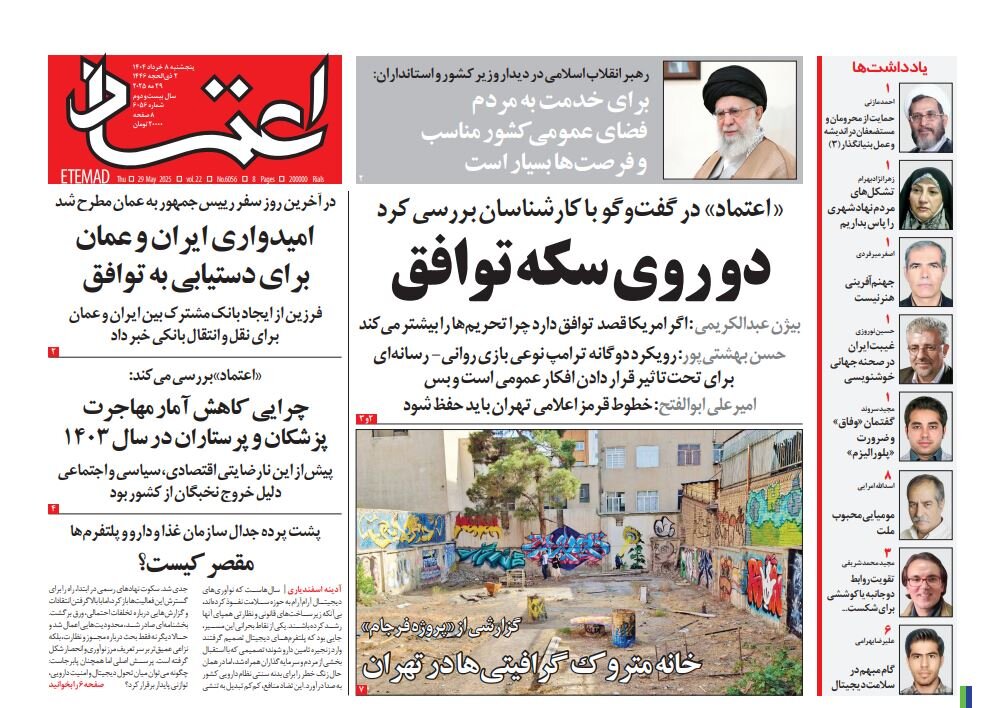Tehran – Etemad looked into negotiations between Iran and the US in an interview with philosophy scholar Bidjan Abdul Karimi.
He said: “This agreement is like a coin, one side is an external agreement with the West, and the other side is an internal agreement with the people, the media and the elite.” Analysts say that over-the-top attention should not be paid to the issue of agreement abroad and lead the political system to ignore the importance of achieving interaction, reconciliation and internal agreements. Initially, the Iranian government adopted sound policies and diplomacy with the United States. Because the West and the US were hoping to create an impression that Iran did not want to negotiate. In reality, Iran disarmed the West and Trump by accepting indirect bilateral negotiations with the United States. They declared that Iran did not want to negotiate, and hoped that they would prepare for an attack on Iran. However, the country’s diplomatic system negotiated intellectually. The Iranian government, like people, must recognize that our challenge with America will not end soon and will be long-term. In the long run, you can’t succeed without the support of people. To get that support, you need national unity. Furthermore, the government must understand the need for unity between the real thing and the country’s military.
Iran: Strategic Partnership between Tehran and Moscow
In the memo, the Iranian newspaper discussed the strategic partnership between Tehran and Moscow by citing Russian affairs expert Mahmoud Shori. Given current conditions, including US sanctions, international issues and global alignment, Iran and Russia must consider cooperation with each other more seriously. The next step is to follow this treaty and take measures that will strengthen relations between the two countries. What is certain is that Iran and Russia have gradually reached the point of their relationship. There they try to ensure that external factors do not have a serious impact on their relationship. The key is that, as such agreements are to create a platform, activists interested in expanding cooperation will not face legal obstacles, or at least know the limitations and boundaries of cooperation under these contracts.
Farhikhtegan: A trip full of opportunity
Commenting on Pezeshkian’s trip to Oman, Fahhictegan wrote: This trip is particularly important in the relationship between Iran and Oman. Oman may consider Oman, as a Persian Gulf country, important to Iran only in terms of its role as a mediator in nuclear negotiations, but the country has a unique position in Tehran’s foreign policy, not only because of its role as a mediator in international negotiations, but also because of its increased economic and cultural relations with Iran. The trip, accompanied by the signing of 14 cooperative documents, holding high-level meetings and business meetings, demonstrates the two countries’ determination to expand relations across all political, economic and cultural fields. Oman is a trusted political mediator, growing trading partner, a new destination for Iranian immigration and has a special place in Iran’s foreign policy. Unlike some countries in the region that have tense ties with Iran, Oman has always adopted a balanced and friendly approach to Tehran. These relationships are based on mutual respect, local cooperation, and avoidance of intervention in each other’s internal affairs.
Jam-e-Jam: Retreat in the face of Iran’s power
In the article, Jam-e-Jam pointed to London’s retreat after Tehran authoritatively responded to Iran’s call for zero enrichment. Foreign Minister Abbas Aragci issued a harsh warning to the UK on Tuesday, saying London’s clear claims about Iran’s “zero enrichment” would waste further dialogue on the nuclear issue. The paper writes: Amid the diplomatic nuclear struggle, the West tried to put new pressure on Iran, facing a strong Iran reaction, and Tehran asserted its country and legal rights. The pressure started with the threat of causing a snapback mechanism (returning UN sanctions on Iran) and imposing zero enrichment on Iran. The British were forced to retreat as Iran thinks these two things will cross the red line. What this diplomatic conflict has revealed is very important. The language of threats and media pressure cannot discourage the Islamic Republic from pursuing legal rights. By relying on legal logic, resistance diplomacy and domestic support for the nuclear industry, Tehran was able to consolidate its position and retreat Europe from its unilateral claims. London’s hideout is not merely a tactical hideout, but a deeper sign of reality that Iran today is not only a negotiating country, but also a powerful and decisive player in regional and international security and diplomatic equations.

